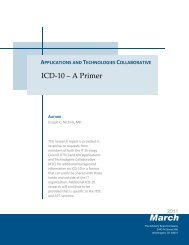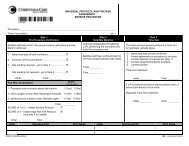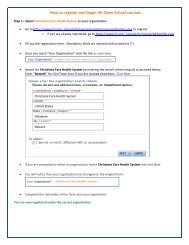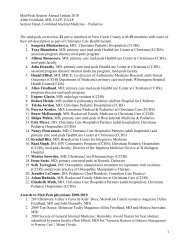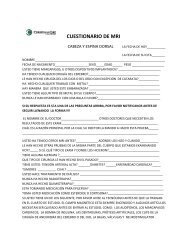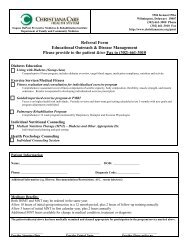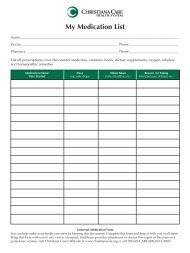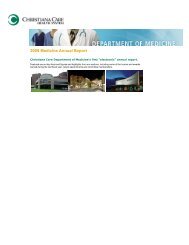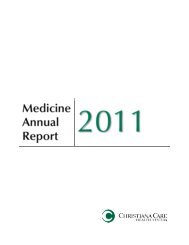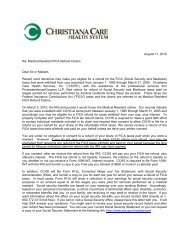Community resources: - Christiana Care Health System
Community resources: - Christiana Care Health System
Community resources: - Christiana Care Health System
You also want an ePaper? Increase the reach of your titles
YUMPU automatically turns print PDFs into web optimized ePapers that Google loves.
Infection controlInfection occurs when a disease-causing bacteria, virus, fungus or germ begins living in or on aperson. Germs are spread by touching body fluids (blood, vomit, urine, stool) or other objects withgerms on them (toys, clothing, bedding). Skin-to-skin contact, coughing and sneezing, andmosquitoes and pets also spread germs. Use the tips below to reduce your chance of spreadinginfection.5 ways to reduce infection in your home1. Wash your hands before and after giving care; after you cough, sneeze or use the toilet; or aftercontact with blood or body fluids. To wash hands effectively:•Use soap, warm water and lots of friction.•Lather and scrub hands and wrists for 15 seconds, paying special attentionto nail and finger areas.•Rinse and dry hands thoroughly.•Use a paper towel to turn off faucet.2.Keep your environment clean. This includes kitchen, bathrooms, counters, floors andrefrigerators. Follow these guidelines:•Provide each person their own toothbrush, towel and wash cloth.•Wash dishes and laundry used by an infected person in warm soapy water.Allow to air dry if possible.•Cover coughs and sneezes with a tissue. Place used tissues in the trash.•Line trash cans with plastic bags. Double-bag an ill person’s trash.3. Minimize your risk:•Cook food thoroughly•Clean cutting boards and work surfaces so raw meats and eggs do not touch other foods.Wash hands after handling raw meats and eggs.•Do not share drinking glasses or eat by dipping food out of a common dish.•If you use well water, have the water tested annually. Kits can be obtained through theDelaware Division of Public <strong>Health</strong>.4. Use precautions when caring for pets:•Keep litter boxes, bird cages and aquariums clean.•Wash hands after contact with animals or their habitats.5. Use gloves correctly:•Only wear gloves once (do not try to wash and save).•Change gloves and wash hands after each contact with an ill person such as changing adiaper or emptying a urinal.•Wear clean, non-sterile gloves when touching sores or wounds; body fluids such as urine,stool; or items covered with blood or body fluids.16



